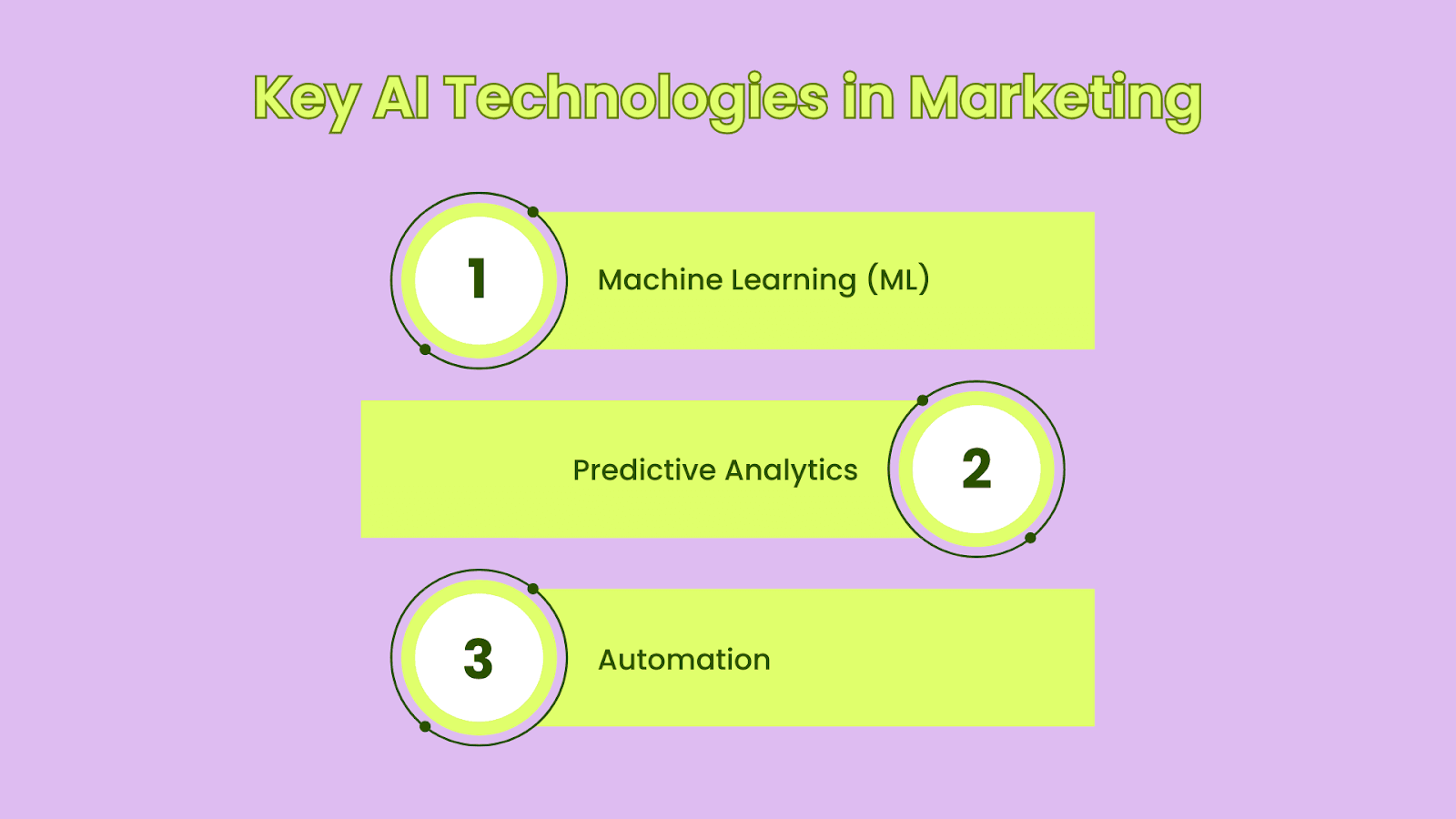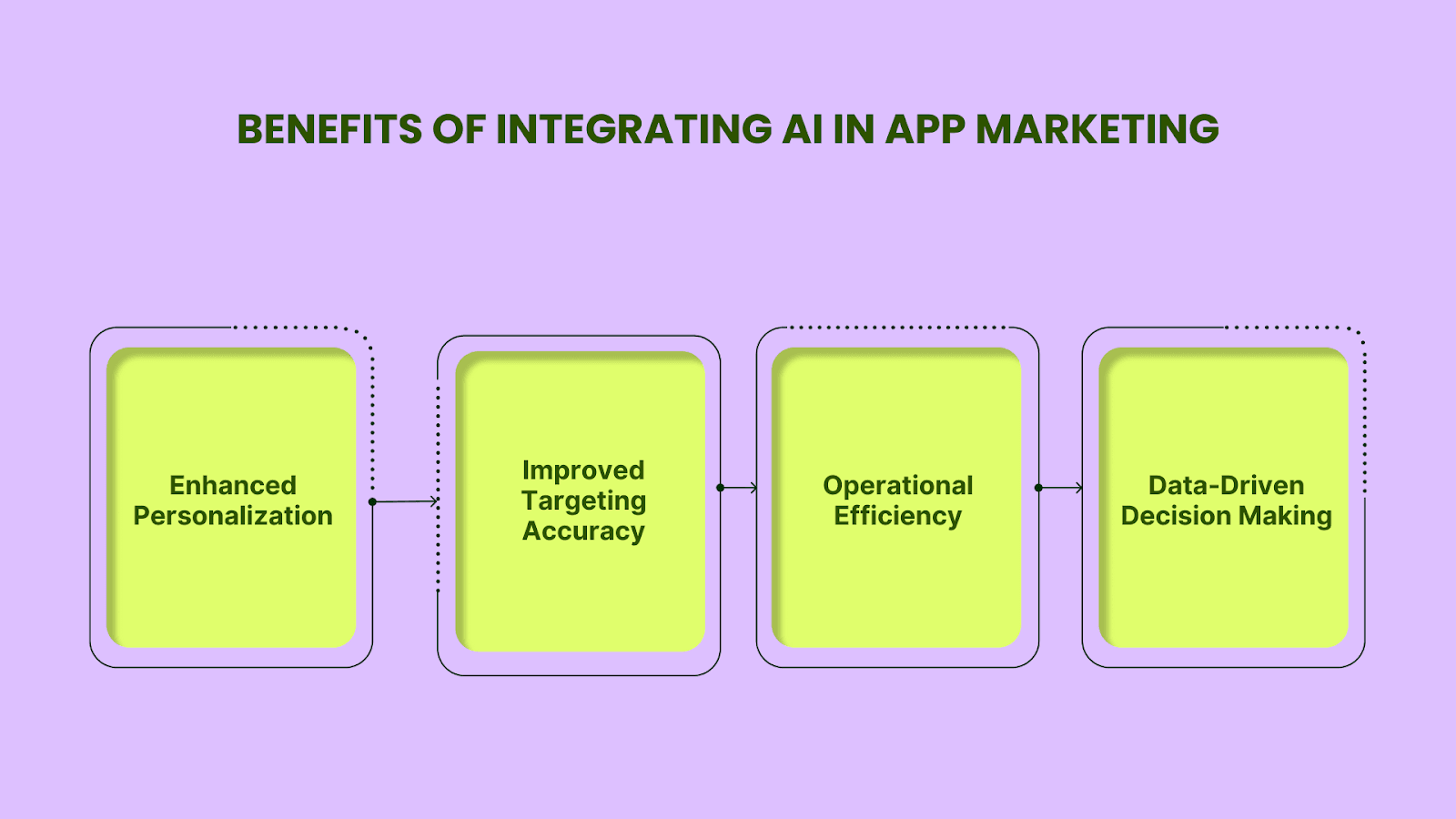How AI Revolutionizes Marketing Strategies
Have you ever wondered how some mobile apps skyrocket in popularity overnight? The secret often lies in how effectively they attract and retain users. In mobile apps, traditional marketing tactics are no longer enough.
Developers and marketers now use Artificial Intelligence (AI) to transform their marketing strategies and improve user acquisition. AI marketing enables the analysis of vast datasets, uncovering patterns and trends that might go unnoticed. This results in more personalized and efficient marketing campaigns, ultimately improving return on ad spend (ROAS).
So, are you struggling with high user acquisition costs or low-quality installs? This blog explores how AI is revolutionizing marketing strategies in the mobile app industry. By the end, you’ll understand how integrating AI into your marketing efforts can streamline user acquisition and drive sustained growth.
Key Takeaways:
How AI revolutionizes mobile app marketing by enabling more personalized, efficient, and data-driven strategies.
Discover how AI technologies enhance user acquisition and retention by analyzing vast datasets and identifying patterns.
Explore how to improve targeting accuracy, customize ad creatives, and monitor campaigns for optimal results.
Explore how AI leads to smarter decision-making, better resource allocation, and ultimately higher return on ad spend (ROAS).
Understanding AI in Mobile App Marketing
Artificial Intelligence (AI) transforms how you approach user acquisition in mobile apps. With AI, you can analyze vast amounts of data to predict user behavior, personalize marketing efforts, and automate processes, leading to more effective and efficient campaigns.
Key AI Technologies

Machine Learning (ML): ML algorithms analyze user interactions within your app to identify patterns and preferences. This enables you to segment your audience more precisely and deliver tailored marketing messages that resonate with each user segment. For instance, by understanding user behavior, ML can let you predict which users are more likely to install your app or retain longer, or generate high revenue, letting you target them with personalized ads by sending post back events to your Ad Networks or MMP.
Predictive Analytics: AI leverages historical data to forecast future user actions, such as the likelihood of purchasing in app assets. By predicting these behaviors, you can proactively adjust your marketing strategies to focus on acquiring high-potential users.
Automation: AI can automate various aspects of your marketing campaigns, from ad creation to AI tagging to campaign performance monitoring. This saves time and ensures your campaigns are consistently optimized for better results.
By integrating AI technologies into your marketing strategy, you can enhance your ability to attract and retain players, ultimately driving the growth of your mobile app or return on ad spend (ROAS).
Now that we've explored how AI supports mobile app marketing, let’s look at how these technologies are applied to enhance and streamline key marketing strategies.
Also Read: Predictive Analytics: Uses in Mobile Games and App Marketing
Enhancing Mobile App Marketing with AI Capabilities
Gaining and retaining users in the mobile app market is increasingly challenging. While traditional marketing strategies remain essential, they often lack the speed, scale, and precision needed to compete effectively. This is where AI-powered tools and capabilities come in, revolutionizing how you attract, engage, and retain users.
By leveraging the power of AI, you can fine-tune your marketing campaigns and optimize your overall user acquisition efforts in previously unimaginable ways. Here’s a breakdown of how AI enhances mobile app marketing strategies:
1. Monitoring Advertising Campaigns with AI
AI takes the complexity out of managing advertising campaigns by providing consistent, deep insights across multiple platforms. With AI’s ability to analyze vast amounts of data, you can measure the performance of your campaigns more effectively and make data-backed decisions.
Automatic Anomaly Detection: AI can spot inconsistencies or sudden changes in campaign performance, such as spikes in CPC or drops in ROAS, enabling you to take action before these issues drastically affect your campaign performance.
Proactive Issue Resolution: AI-powered tools send alerts when something’s wrong. This lets you address potential problems, such as poorly performing creatives or incorrect targeting, and resolve them before they lead to wasted ad spend.
Integrating Segwise AI campaign monitoring agent feature automatically pulls data from your MMP or ad networks, analyzes it, and alerts you to any issues or deviations in campaign performance. It’s almost like a to do list of campaigns, ad groups and creatives that need your attention, on a daily basis. This ensures your campaigns stay on track, ultimately driving higher-quality installs without unnecessary interruptions.
Also Read: Analyzing And Measuring Campaign Performance Metrics And Strategies
2. Tailored Content Delivery
AI empowers you to craft highly personalized and effective ad content, driving higher engagement and conversion rates. By analyzing user data, AI ensures the creation of dynamic and adaptive content that resonates with individual users, increasing the likelihood of app installs.
Customizing Ad Creatives
In mobile game marketing, delivering tailored ad experiences is crucial for driving user acquisition. Segwise's Creative Agentleverages AI technology to automate the tagging of various creative elements such as characters, backgrounds, calls to action, and emotional hooks across diverse ad formats, including videos and playables.
This automation enables you to identify which specific creative components resonate most with your target audience. You can use this to create high-impact and effective creative ads that are likely to convert. By streamlining the process of creative tagging, analysis, and optimization, user acquisition teams can improve ad relevance, creative impact, ad engagement rates, and ultimately increase return on ad spend (ROAS).
Dynamic Difficulty Adjustment (For Games)
User acquisition (UA) is not solely about attracting new players; it's equally about retaining them. One effective strategy to achieve this balance is through Dynamic Difficulty Adjustment (DDA).
DDA uses AI to monitor individual player performance and adjust the game's difficulty. This personalization ensures that players are neither overwhelmed by excessive challenges nor bored by tasks that are too easy. By maintaining an optimal level of challenge, enjoyment and early gratification, DDA enhances player satisfaction, which is crucial for retention and UA campaigns' effectiveness.
Moreover, DDA can inform UA strategies by identifying player segments that are more likely to convert into high retaining and high ARPU (paying) users. By analyzing how different difficulty levels impact player behavior, you can tailor your acquisition strategies to attract users who are more likely to stay and spend.
3. AI Enhances User Acquisition and Retention
AI doesn’t just let you attract new users; it also enables you to retain them. By analyzing user behavior, AI identifies patterns and trends that let you create targeted campaigns to acquire high-value users likely to engage with your app long-term.
Create Targeted Campaigns: In mobile game marketing, acquiring high-quality users is paramount. AI empowers UA campaigns by enabling precise segmentation based on player behavior and demographics. This data-driven approach ensures that ads reach users who are most likely to install and engage with your game, optimizing your marketing spend.
For instance, AI can identify patterns in user behavior to predict which segments are most likely to become high paying players, allowing for tailored messaging and offers that resonate with each group. This personalized approach not only enhances user acquisition but also fosters long-term player retention.
Early Detection of Creative Fatigue: In mobile game advertising, AI plays a crucial role in identifying when ad creatives lose effectiveness, a phenomenon known as creative fatigue. By proactively monitoring your campaign data and analyzing user interactions, AI tools like Segwise can pinpoint subtle declines in engagement metrics such as click-through rates (CTR), video completion rates, and conversion rates, which are early signs of ad/creative fatigue. This early detection allows you to proactively refresh creatives or change your targeting, ensuring sustained user interest and optimal return on ad spend (ROAS).
For instance, Segwise's AI-powered Campaign Monitoring Agent monitors campaign performance across various ad networks, providing insights into which creative elements are resonating with players.
Optimizing Retention Campaigns: Once users install your app, AI tools can continuously analyze user behavior to identify patterns suggesting which users are at risk of disengaging. Many AI tools can now also help you run highly effective RFM analysis, where they segment customers based on their recent purchases, purchase frequency, and the monetary value of their transactions. With this data, you can create personalized retention campaigns that encourage users to stay engaged.
You can also tailor push notifications based on a user's gameplay history, offering reminders, rewards, or challenges that align with their interests. Additionally, AI can be used for automated LiveOps where new in-game content or features that match a user's progression and playstyle are introduced to enhance engagement. These strategies ensure that users remain invested in your game, leading to improved retention rates and fostering long-term user loyalty.
By integrating AI-powered tools into your marketing strategies, you can improve engagement and ensure sustained growth for your mobile app.
As we've explored how AI can optimize various aspects of mobile app marketing, let's take a closer look at a real-world example of how a leading mobile game developer has successfully implemented AI to tackle key challenges.
Also Read: Mobile Gaming App User Retention Strategies and Benchmarks
Case Study: Zynga's AI-Driven Approach
Zynga, a leading developer of popular mobile games, faced challenges with rising User Acquisition Costs. Despite having popular titles, their traditional marketing channels were becoming ineffective, leading to escalating costs for acquiring new users.
AI Implementation
Predictive Analytics: Zynga utilized AI algorithms to analyze historical user data and predict which users were more likely to engage with their games. By identifying high-potential users, Zynga could direct their advertising efforts more effectively, ensuring they were targeting users who had a higher probability of conversion. This predictive approach allowed for more efficient use of advertising budgets and minimized wasted impressions.
Creative Optimization: AI tools were employed to continually test and optimize Zynga’s ad creatives. By using machine learning, Zynga could dynamically assess which visuals, messaging, and ad formats resonated the most with their target audience. This data-driven optimization ensured that Zynga’s ads remained fresh, engaging, and relevant, ultimately driving higher engagement rates and improving user acquisition outcomes.
Improved Onboarding Process: Zynga implemented AI to enhance the onboarding process for new users. The AI-driven approach ensured that new players were guided through a smooth and personalized introduction to the game, making the experience more engaging and increasing the chances of retention. By optimizing this critical touchpoint, Zynga was able to reduce friction for new users and encourage long-term engagement, while simultaneously lowering overall acquisition costs.
Targeted User Segmentation: AI helped Zynga segment its user base with greater precision. By analyzing user behaviors and preferences, Zynga could tailor its marketing messages to specific demographics, ensuring that ads were more relevant and appealing. This level of personalization increased the relevance of their campaigns and boosted campaign performance by delivering content that resonated deeply with different user segments.
Results
Reduced User Acquisition Costs: Zynga significantly reduced user acquisition costs by targeting high-value users and optimizing ad creatives.
Improved Campaign Efficiency: Predictive analytics enables timely adjustments, enhancing the overall efficiency of marketing campaigns.
Now, let's explore the advantages of adopting AI in mobile app marketing.
Benefits of Integrating AI in App Marketing
Integrating AI into app marketing strategies offers many advantages, making your marketing efforts more personalized and efficient. Here are the key benefits:

Enhanced Personalization
AI enables the creation of customized content and tailored offers that resonate with individual players, driving higher engagement and fostering loyalty. By analyzing player behavior, preferences, and in-game actions, AI helps deliver personalized experiences that are directly aligned with each player’s interests. For mobile game marketers, this level of personalization is critical - it not only enhances the player's overall experience but also significantly boosts retention rates.
Players are more likely to stay engaged with an app that continually provides content and rewards that match their personal preferences, increasing the likelihood of long-term retention and improving the overall return on ad spend (ROAS).
Improved Targeting Accuracy
In mobile gaming, reaching the right players at the right time is crucial. AI revolutionizes this by leveraging postback events. These are data signals sent from ad networks or Mobile Measurement Partners (MMPs) back to your analytics platform or server. These events provide feedback on user actions, such as app installs, in-app purchases, or level completions, enabling precise tracking of campaign performance.
By analyzing these postback events, AI can:
Identify high-value players: Recognize patterns in user behavior that indicate potential for higher engagement and lifetime value.
Optimize targeting: Based on the latest data, adjust ad delivery to focus on audiences most likely to convert.
Maximize ROI: Allocate advertising budgets more effectively by concentrating efforts on segments with the highest return potential.
This dynamic approach ensures that your marketing strategies are data-driven and agile, adapting swiftly to user interactions and market trends. The result? A more efficient use of your ad spend and a higher likelihood of attracting valuable users, propelling your game's success in the market.
Operational Efficiency
AI automates many time-consuming tasks, such as campaign monitoring and ad optimization. By streamlining these processes, AI reduces operational costs and lets marketing teams allocate resources more effectively. Here’s how the process works:
Campaign Monitoring Automation: AI continuously tracks campaign performance, identifying trends and anomalies without requiring manual intervention.
Ad Optimization: In mobile gaming, ad optimization plays a crucial role in user acquisition, and AI takes this to the next level. AI-powered tools analyze vast amounts of ad data to adjust bidding strategies, creative elements, and targeting automatically.
While AI can handle many aspects, the actual control of these adjustments often comes through third-party mediation tools integrated with ad networks. These vendor tools help manage inventory, optimize ad placements, and adjust strategies in real-time based on performance, ensuring each marketing dollar maximizes ROI.
This increased efficiency enables you to focus on high-level strategy and creative development, while AI handles the repetitive tasks, resulting in faster execution and more cost-effective operations.
Data-Driven Decision Making
AI’s analytics capabilities provide actionable insights that inform marketing strategies. By continuously processing data, AI lets you swiftly adapt to changing market trends and consumer behaviors. This enables you to make more informed, data-backed decisions, improving the effectiveness of campaigns and ensuring that your strategies remain relevant in a constantly evolving mobile app market.
Conclusion
Artificial Intelligence (AI) has transformed mobile app marketing, enabling you to move beyond traditional strategies. By leveraging AI marketing technologies such as machine predictive analytics and automation, you can analyze vast datasets to predict user behavior, personalize marketing efforts, and automate processes. This leads to more effective and efficient campaigns, enhancing user acquisition and retention.
To fully harness the potential of AI in your marketing efforts, consider integrating Segwise into your strategy. Segwise offers AI-powered tools to optimize your user acquisition campaigns by providing insights into creative performance and automating campaign monitoring. With features like the Creative Agent and Campaign Monitoring Agent, Segwise empowers you to make data-driven decisions that enhance your marketing efficiency and effectiveness.
Ready to elevate your mobile app marketing with AI? Start your journey by signing up for a 14-day free trial today!
Frequently Asked Questions
1. How does AI enhance cross-channel marketing for mobile apps?
AI facilitates cross-channel marketing by integrating data from various platforms, creating a unified customer view. This enables personalized messaging across channels, improves user engagement, and boosts awareness through consistent communication.
2. How does AI-driven automation reduce the time spent on manual marketing tasks in mobile app campaigns?
AI-driven automation streamlines repetitive tasks such as campaign monitoring and performance analysis. This reduces manual workload, minimizes errors, and lets marketing teams focus on strategic decision-making, enhancing overall campaign efficiency.
3. How can mobile app developers use AI to optimize app store marketing and visibility?
AI enhances App Store Optimization (ASO) by analyzing user behavior to identify high-performing keywords, optimizing app metadata, and predicting trends.

Comments
Your comment has been submitted